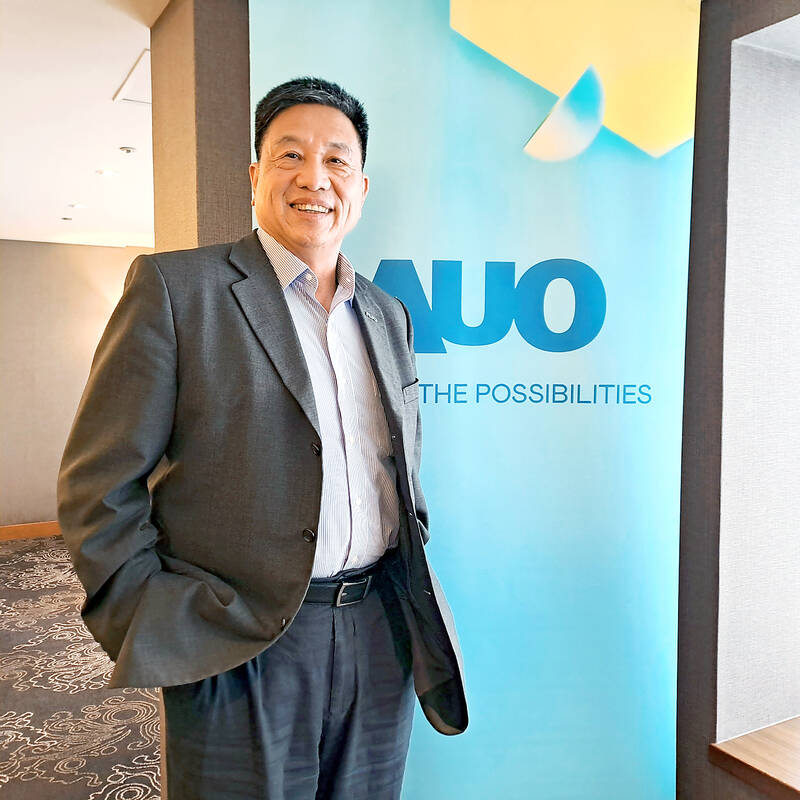Flat-panel display supplier AUO Corp (友達) on Wednesday said it was monitoring the potential fallout from US tariff uncertainty after reporting a profit for the second straight quarter, as customers rebuilt inventory while others pulled in orders ahead of new tariffs.
AUO holds a cautious attitude toward this quarter and visibility for the second half of the year is blurry, as customers are closely watching how the US government’s tariff policy would affect display demand and market consumption, the company said.
“The company had expected the overall market to reach a relatively balanced situation and return to seasonal patterns. However, the tariff uncertainty might have disturbed seasonal demand this year,” AUO chairman Paul Peng (彭双浪) told an online earnings conference.

Photo: CNA
“We have seen some customers’ pull-in demand amid potential fallouts from the US tariff policy,” he said.
As panel displays might become the next item subject to levies under a separate US tariff scheme, AUO is considering working with supply chain partners to come up with plans for manufacturing in regions that have lower tariffs, Peng said.
However, the company is not considering a front-end panel plant in the US due to a lack of panel assembly lines there, he said.
As a panel display and components supplier, AUO expects a mild impact from US tariffs, Peng said.
“About 10 to 15 percent of AUO’s total revenue comes from direct and indirect exposure to the US,” he said, adding that the company is shipping goods on free-on-board terms, meaning that customers would be responsible for duty levies.
The company would closely monitor US tariff developments in the second half of this year and work with customers to adjust manufacturing sites, he said.
AUO president Frank Ko (柯富仁) said the company’s display business last quarter benefited from inventory restocking demand following strong TV sales in the fourth quarter of last year and Chinese subsidies to encourage people to retire old consumer electronics.
The company said the display business in the first quarter performed better than expected, but revenue this quarter is likely to decline slightly due to a higher comparison base.
The display business made up 54 percent of the company’s revenue last quarter.
Its mobility solution business, including displays for auto cockpits, is expected to see revenue drop by a low-single-digit percentage sequentially, the company said.
Revenue from its vertical solution business, including display-related solutions for the retail, medical and industrial segments, is projected to grow by a mid-to-high single-digit percentage, it said.
During the March quarter, AUO’s net profit more than doubled to NT$3.29 billion (US$102.8 million) from NT$1.62 billion the previous quarter. During the same period last year, the company lost NT$3.53 billion.
Operating income improved to NT$1.14 billion last quarter, snapping two quarters of operating losses, while gross margin rose to 12.2 percent, from 7.9 percent in the previous quarter and 3.3 percent in the same period last year, the company said.

In Italy’s storied gold-making hubs, jewelers are reworking their designs to trim gold content as they race to blunt the effect of record prices and appeal to shoppers watching their budgets. Gold prices hit a record high on Thursday, surging near US$5,600 an ounce, more than double a year ago as geopolitical concerns and jitters over trade pushed investors toward the safe-haven asset. The rally is putting undue pressure on small artisans as they face mounting demands from customers, including international brands, to produce cheaper items, from signature pieces to wedding rings, according to interviews with four independent jewelers in Italy’s main

Japanese Prime Minister Sanae Takaichi has talked up the benefits of a weaker yen in a campaign speech, adopting a tone at odds with her finance ministry, which has refused to rule out any options to counter excessive foreign exchange volatility. Takaichi later softened her stance, saying she did not have a preference for the yen’s direction. “People say the weak yen is bad right now, but for export industries, it’s a major opportunity,” Takaichi said on Saturday at a rally for Liberal Democratic Party candidate Daishiro Yamagiwa in Kanagawa Prefecture ahead of a snap election on Sunday. “Whether it’s selling food or

CONCERNS: Tech companies investing in AI businesses that purchase their products have raised questions among investors that they are artificially propping up demand Nvidia Corp chief executive officer Jensen Huang (黃仁勳) on Saturday said that the company would be participating in OpenAI’s latest funding round, describing it as potentially “the largest investment we’ve ever made.” “We will invest a great deal of money,” Huang told reporters while visiting Taipei. “I believe in OpenAI. The work that they do is incredible. They’re one of the most consequential companies of our time.” Huang did not say exactly how much Nvidia might contribute, but described the investment as “huge.” “Let Sam announce how much he’s going to raise — it’s for him to decide,” Huang said, referring to OpenAI

The global server market is expected to grow 12.8 percent annually this year, with artificial intelligence (AI) servers projected to account for 16.5 percent, driven by continued investment in AI infrastructure by major cloud service providers (CSPs), market researcher TrendForce Corp (集邦科技) said yesterday. Global AI server shipments this year are expected to increase 28 percent year-on-year to more than 2.7 million units, driven by sustained demand from CSPs and government sovereign cloud projects, TrendForce analyst Frank Kung (龔明德) told the Taipei Times. Demand for GPU-based AI servers, including Nvidia Corp’s GB and Vera Rubin rack systems, is expected to remain high,